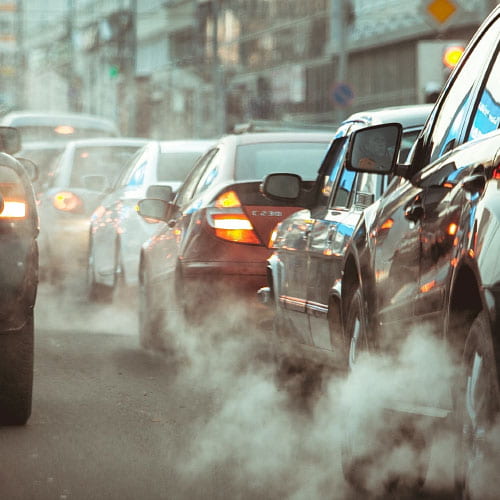By Jordin Metz
Graduate Student, Department of Chemistry, Rice University
The Covid-19 pandemic has brought much of the world to a standstill, yet it has demonstrated that scientists can come together to address an issue that adversely affects everyone. This is reminiscent of another challenge that requires large scale cooperation: climate change. However, as the pandemic begins to devastate the U.S. economy, certain U.S. policymakers are using it as an opportunity to roll back environmental regulations. For instance, the White House is weakening emissions enforcement and reducing automobile mileage standards. These rollbacks will lead to increased air pollution, which will damage Americans’ lungs and increase the risk of complications and death from Covid-19 and other future respiratory diseases. While addressing the spread of the Covid-19 virus and the health of our population is the utmost priority, this cannot be done at the expense of our environmental future, particularly as more pollution will exacerbate health problems in the short- and long-term.
The Covid-19 pandemic has had a clear short-term impact on the environment. Billions of people are staying home and no longer driving or flying, resulting in a significant decrease in greenhouse gas emissions. China, the world’s largest energy consumer and polluter, saw a 25% decrease in emissions, and NO2, a respiratory irritant, declined by 36% the week after widespread travel restrictions were put into place. As the virus and subsequent shutdowns spread around the globe, a similar shift in emissions has occurred. Levels of CO and CO2 in New York City are down by 50% and ~10%, respectively. This decrease in air pollution has not only benefitted the environment (at least in the short term), but has also potentially saved lives. Marshall Burke from Stanford University calculated that China’s recently improved air quality could save thousands from premature deaths: up to 4000 children under age five and 73,000 adults over age 70.
Unfortunately, officials have used the economic downturn as an opportunity to roll back environmental regulations. The Environmental Protection Agency (EPA) is loosening pollution enforcement rules and weakening automobile mileage standards. Facilities such as power plants and factories can now decide whether to report air and water pollution. These rules essentially strip the EPA of its enforcement power, as the agency will not issue fines for a variety of rule violations and noncompliance. The mileage standard changes, called the Safer Affordable Fuel-Efficient (SAFE) Vehicles Rule, will reduce the requirement for automakers to improve the fuel economy of their vehicles, decreasing annual improvements from 5% to 1.5%. This dramatic drop is expected to emit ~900 million more tons of carbon dioxide into the atmosphere. The Trump administration claims these measures are to assist companies during the pandemic and to encourage Americans to buy more cars. These potential economic benefits are fiercely debated, with one projection showing new vehicles will actually cost Americans $2100 more.
However, the real dark side to all these rollbacks is that increased air pollution is associated with the deaths of more Americans. Air pollution is strongly linked to increased risks of asthma, respiratory illnesses, and pneumonia, and it increases individuals’ exposure to fine particulate matter (PM2.5), which is a major risk for premature death that disproportionately affects the elderly. These are key risk factors affecting vulnerable populations for Covid-19. A new study out of Harvard shows that greater exposure to PM2.5 in the years leading up to the pandemic has dramatically increased the likelihood of death for Americans with Covid-19. Even a small, one-unit increase (1 µg/m3) in the pollution level is associated with a 15% increase in the death rate. Air pollution damages the lungs, increasing the risk of respiratory problems and making people more susceptible to complications and death related to Covid-19. This study further stresses the need to maintain and strengthen air pollution regulations; reducing regulations will cause more Americans to suffer and die from this pandemic and from future respiratory disease outbreaks.
Our government can help to increase the odds of survival for Americans with Covid-19 while also making our country more resilient to future pandemics. With low interest rates, the government can invest in clean energy infrastructure and work to decarbonize industries, which would create jobs and help ensure resilience in the case of another pandemic or global catastrophe through stable, domestic energy sources. Companies that receive government bailouts should be required to reduce their carbon emissions and to invest in green energy. There is an opportunity to use the massive economic stimulus packages to not only repair the economy, but to push it forward into an era of resiliency and sustainability, reducing dependence on oil and foreign resources. Rolling back environmental regulations will be detrimental to Americans in the short and long term. Fighting the virus while also building American infrastructure and battling climate change will help rebuild America’s health and economy.
This blog post is part of the Baker Institute Science and Technology Policy Program’s Developing Civic Scientist Leaders project.
